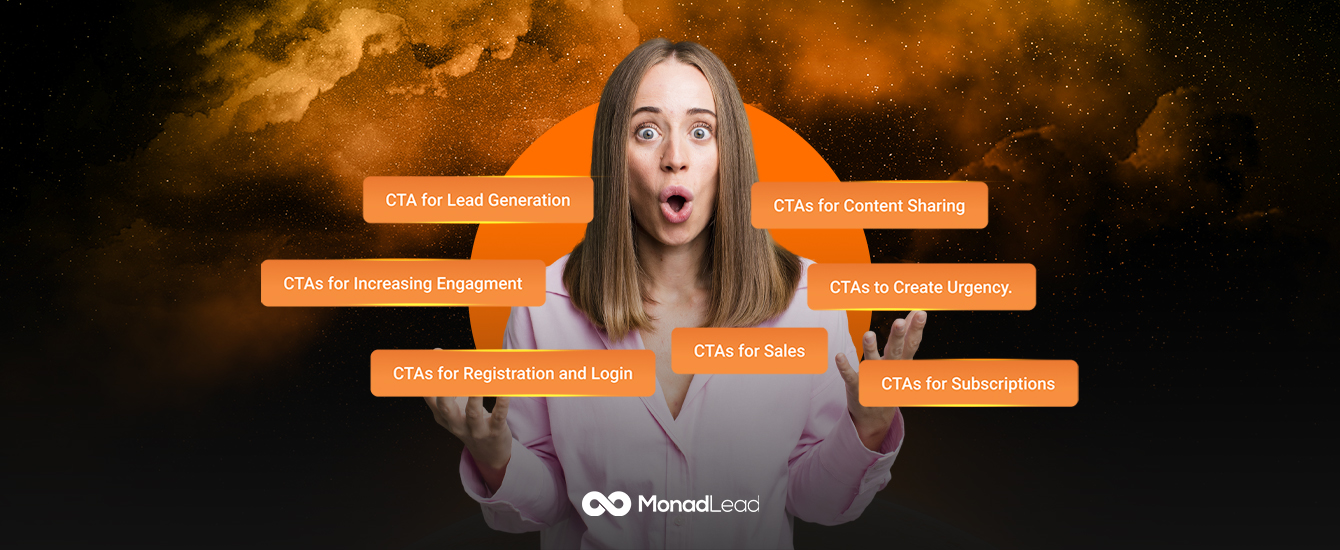A Call to Action (CTA) is the crucial step that prompts your potential customer to take the desired action you've planned for them. The success of an affiliate marketing campaign depends on how well each step performs. A well-crafted CTA is crucial too. Think of your CTA as a door: it's the point at which your customer must act to move forward in their journey.
CTAs are important because they encourage visitors to take action. This could mean making a purchase, signing up for a newsletter, or engaging with content. If the door isn’t inviting enough, they won’t take the step.
In this post, we’ll explore the importance of CTAs, their psychology in affiliate marketing, and the various types of CTAs you can use. Plus, we’ll share 67 effective CTA examples to inspire your next campaign.
Importance of CTAs in Affiliate Marketing
Like any other part of an affiliate marketing strategy, the CTA deserves careful attention and shouldn’t be overlooked. A well-crafted CTA plays a key role in improving conversion rates, enhancing user experience, and ensuring clear communication with your audience.
A good CTA guides the user to the next step in the journey and ultimately drives them towards making a purchase. When you think about the psychology of the CTA, make sure it matches the user's intent. This will greatly improve the overall user experience. Clear communication is at the heart of an effective CTA — the user must know exactly what to expect once they take action, which is why clarity is essential.
Here are three additional ways a strong CTA can improve your affiliate marketing results:
- SEO Impact: While SEO in affiliate marketing is typically not directly tied to CTAs, a well-crafted CTA can still positively influence SEO. A good CTA encourages users to engage more with your content, and increased user engagement signals to search engines that your content is valuable, ultimately improving your site's ranking.
- Emotional Appeal: Emotional appeals in CTAs often go under-discussed but can make a significant impact. Using language that conveys urgency (e.g., "Don’t miss out, act now!") or creates a sense of community (e.g., "Join over 9,738 readers") helps forge a deeper connection with your audience and motivates them to take action.
- Personalization: Personalizing your CTA based on user interests can significantly increase engagement. Rather than using generic phrases like "Click here" or "Learn more," tailoring your CTA to the individual’s preferences can lead to higher conversion rates.
Steps for Creating Best CTAs in Affiliate Marketing
Based on our experience, we’ve broken down the process of creating an effective CTA into five key steps. Each of these five steps — understanding the audience, defining clear goals, CTA design, testing, and installation — will be discussed in detail.
The first step is understanding your audience. With the help of personas we've created, we clearly define who the CTA is targeting. We then tailor the CTA to meet the needs of each audience segment.
For instance, if the CTA targets a younger audience, we opt for a dynamic and informal approach. For a more professional tone, we use direct and informative language.
The second step is defining a clear action. The goal of the CTA is to precisely tell the user what action they need to take. That’s why we use active verbs like "Download" and "Sign up," paired with specific language that clearly defines the user’s next step. Instead of using generic phrases, craft a statement that combines active verbs with concrete details, focusing on the unique benefits the user will gain by taking action.
CTA design plays a crucial role in capturing the user's attention. Our designers are highly skilled and typically require little guidance. However, we asked for their input, and they suggested a few key elements that can help differentiate our CTAs from the competition.
Use contrasting colors that stand out from the rest of the page, along with simple, legible fonts. If appropriate and aligned with the design, consider adding subtle visual elements or animations to draw attention. Additionally, providing extra space around the CTA ensures it’s easily noticeable. Positioning is just as important, and our designers advise placing the CTA where it will catch the user’s eye.
The penultimate step is A/B testing. The goal of testing is to determine which version of the CTA performs better and delivers the desired results. To conduct effective testing, you’ll need at least two versions of your CTA. You can also test individual elements such as the text, color, size, or position to see what works best.
The final step is positioning the CTA. Proper positioning is key to ensuring visibility and maximizing conversion rates. We place our CTAs in three main areas: above the fold (the primary position), within the content after key information, and at the end of the content (secondary CTAs).
Additionally, placing a CTA in the sidebar or using a floating banner that follows the user as they scroll can be effective strategies to boost engagement.
Different Types of CTAS in Affiliate Marketing
In theory, CTAs could be categorized in numerous ways, but we’ve chosen to focus on one simple division based on the specific goals each CTA aims to achieve. Here’s the breakdown:
- Lead Generation CTAs: These are designed to collect contact information for future engagement. Examples include: Sign up for our newsletter, Download a free guide, Register for a webinar.
- Sales CTAs: These encourage users to purchase products or services. Examples include: Add to cart, Buy now, Order with a discount.
- Social Sharing CTAs: These aim to increase visibility and promote content through social networks. Examples include: Share on Instagram, Recommend to a friend, Leave us your feedback.
- Engagement CTAs: These encourage users to spend more time on the site and engage with the content. Examples include: Read to the end, Watch the video, Ask us anything.
- Registration and Login CTAs: These aim to encourage users to create a profile or sign up. Examples include: Register for free, Sign up for access, Access your account.
- Subscription CTAs: These encourage users to subscribe to specific services or content. Examples include: Subscribe to premium content, Activate your free trial, Don’t miss notifications.
- Urgency CTAs: These encourage users to act quickly by adding a sense of urgency. Examples include: Offer expires soon, Book now, Don’t miss this opportunity.
This classification of CTAs, based on their respective goals, helps streamline the process of selecting the right type of CTA for your content. It’s important to first identify the type of content you’re offering, define what action you want from the user, and then choose the CTA that best aligns with that goal. This is straightforward, isn’t it?
Examples of Effective CTAs in Affiliate Marketing
Here are some examples of effective CTAs in affiliate marketing, divided into categories based on their specific goals:
CTAs for Lead Generation:
- Sign up for our newsletter
- Download the free guide now
- Register for a free webinar
- Request a free e-book
- Access exclusive content
- Request a free consultation
- Sign up for our educational email series
CTAs for Sales:
8. Add to cart
9. Buy now
10. Use discount today
11. Order now with free delivery
12. Sign up for special offers
13. Buy with a free gift
14. Check out our latest products
CTAs for Content Sharing:
15. Share on social media
16. Recommend to a friend
17. Leave a review
18. Rate this article
19. Share your opinion with us
20. Share with your followers
21. Spread the word
CTAs for Increasing Engagement:
22. Read more
23. Watch our video guide
24. Ask us a question here
25. Comment below
26. Check out related articles
27. Explore our popular posts
28. Discover the latest topics
CTAs for Registration and Login:
29. Register for free
30. Create an account now
31. Log in for additional benefits
32. Sign up to save your favorite items
33. Join now to unlock extra features
34. Sign up for VIP access
CTAs for Subscriptions:
35. Subscribe to premium content
36. Activate your free trial
37. Subscribe for notifications
38. Subscribe for exclusive offers
39. Sign up for our monthly newsletter
CTAs to Create Urgency:
40. Offer expires soon – act now
41. Reserve before the offer disappears
42. Buy before stock runs out
43. Don’t miss this exclusive opportunity
44. Take advantage of the promotional price before it ends
This division of CTAs helps identify the right approach for each specific goal in affiliate marketing, making it easier to tailor your message based on what you want to achieve.
Best Way to Implement CTA in Affiliate Marketing Strategy
The best way to implement CTAs into an affiliate marketing strategy is difficult to determine because, as mentioned earlier, it depends on many factors. However, outlining what not to do to properly integrate CTAs into affiliate marketing strategies is easier.
First and foremost, you need to have CTAs. Imagine a house without doors—doesn’t make much sense, right? Any content without a CTA is like a room with no doors—no one can enter or leave. Proper implementation of CTAs is crucial for increasing conversion rates.
Without placing CTAs in strategic locations within the content, you won’t see an increase in conversions. They must be clear, specific, and tailored to the persona they’re intended for. Testing and optimization are key parts of marketing. Without good testing, you won’t know which option works best.
Lastly, never forget to deliver what you promise in the CTA. Nothing is worse than disappointing users with a misleading CTA.
Table of Content
Subscribe and follow











